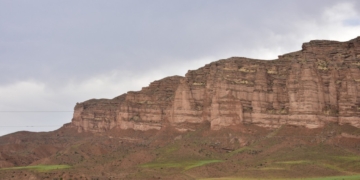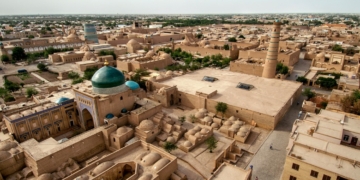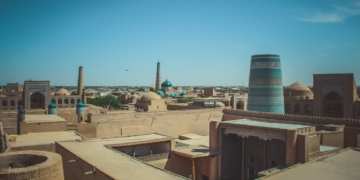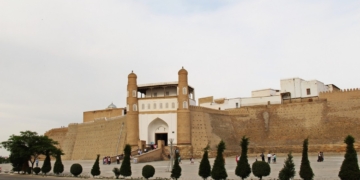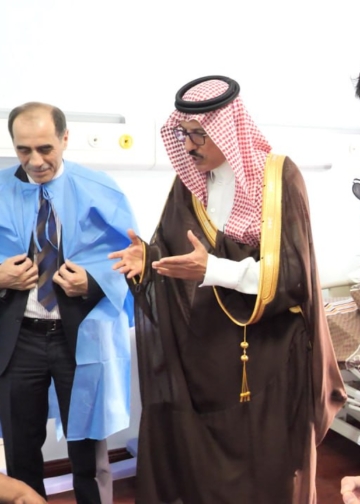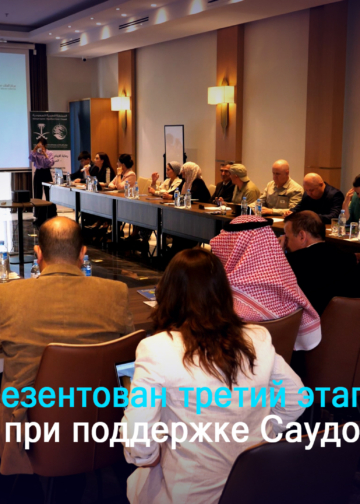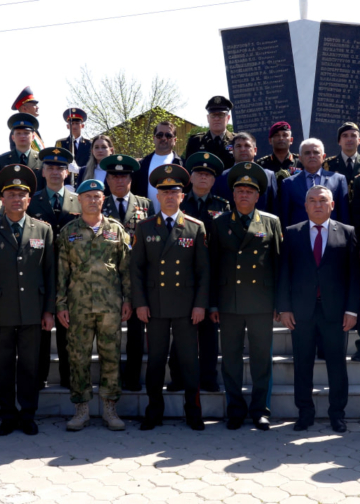id: 44064
date: 10/31/2005 10:22
refid: 05DUSHANBE1745
origin: Embassy Dushanbe
classification: CONFIDENTIAL
destination: 05DUSHANBE1729
header:
This record is a partial extract of the original cable. The full text of
the original cable is not available.
—————— header ends —————-
C O N F I D E N T I A L DUSHANBE 001745
SIPDIS
E.O. 12958: DECL: 10/31/2015
TAGS: PREL, PGOV, PHUM, KDEM, TI
SUBJECT: TAJIKISTAN: UN SPECIAL
RAPPORTEUR FINDS JUDICIARY
UNBALANCED
REF: DUSHANBE 1729
CLASSIFIED BY: Richard Hoagland, Ambassador, US Embassy
Dushanbe, State.
REASON: 1.4 (b)
1. (C) During his recent visit to Tajikistan, UN
Special
Rapporteur on Independent Judiciary and Lawyers Leandro Despuy
noted a great imbalance between the power of Tajikistan’s
prosecutors, and the weakness of lawyers («advocates») and
judges in the system. United
Nations Tajikistan Office of
Peacekeeping’s (UNTOP) Ambassador Vladimir Sotirov reported
Despuy found the prosecutors’ ability to initiate investigations
and prevent the implementation of a court decision distortedQe
objectivity and fairnesQof theQurt process. Judges are too
often afraid of proQcutors. He
hoped the parliament’s reforms
to the criminal code would remove these powers from the
prosecutor, thus legislating a more balanced judicial system.
2. (C) NOTE: A current case in point is journalist Jumaboy
Tolibov. Having written articles criticizing the Prosecutor’s
Office in Sogdh province, he was arrested and sentenced to
prison. Acting on his appeal, the
Supreme Court’s Criminal
Affairs Board ordered his release. The Prosecutor General
overruled the Supreme Court, and Tolibov remains behind bars.
END NOTE
3. (C) According to Sotirov, Despuy enjoyed access
to all
levels of government, and remarked on Tajik interlocutors’
openness. People were unafraid to
share their concerns about
salaries, corruption, and a need for better training. The
Special Rapporteur will prepare a report on his visit for the UN
High Commission on Human Rights; he should publish his full
findings in Spring 2006.
4. (C) Turning to other issues, Sotirov observed
UNTOP’s
«relationship of trust» with the Tajik government allowed them
to address a number of sensitive issues not specifically in
their mandate. For example, UNTOP
was addressing a number of
complaints they had received from citizens and inmates about
food and sanitation conditions in prisons. UNTOP experienced
the same difficulties and frustratiQs as other international
missions Qng through the MFA to get meetings (reftel), but
characterized it as bureaucratic, not political. «They don’t
have the administrative capacity to tackle requests.»
5. (C) Sotirov referred to the Iskandarov trial as a
step in
the «political elimination of the warlords» after the Civil
War.
He observed that democratic
reforms were not an easy sell to
the Tajik public for two reasons. First, many think democracy
caused the civil war, so enthusiasm for democratic initiatives
is limited. Second, remembering
the Civil War, many equate the
political opposition with a potential military opposition.
6. (C) COMMENT: It is not surprising that Tajik interlocutors
spoke to the Special Rapporteur openly about problems of
corruption and salaries-these are safe topics which generate
much hand-wringing and head-nodding, but few viable solutions.
UNTOP can sometimes take a cautious approach to the government
of Tajikistan, and is careful to preserve its status and limited
influence, but also uses its unique position to address problems
delicately where other institutions have limited access.
HOAGLAND
NNNN
=======================CABLE ENDS============================
id: 44072
date: 10/31/2005 11:11
refid: 05DUSHANBE1746
origin: Embassy Dushanbe
classification: UNCLASSIFIED//FOR OFFICIAL USE ONLY
destination:
header:
This record is a partial extract of the original cable. The full text of
the original cable is not available.
—————— header ends —————-
UNCLAS DUSHANBE 001746
SIPDIS
SENSITIVE
STATE FOR EUR/CACEN, SA, EAP, EB
NSC FOR MERKEL
E.O. 12958: N/A
TAGS: PREL, ECON, ETRD, ELAB, KDEM, JA, IN, AF, UZ, TI
SUBJECT: TAJIKISTAN: JAPANESE
CHARGE: «TOKYO LOOKING FOR NEW
IDEAS
FOR CENTRAL ASIA»
1. (SBU) New Japanese Charge
d’affaires Hiroshi Takahashi
called on the Ambassador on October 26. Unlike his, Takahashi
is energetic and brimming with ideas based on his extensive
experience in Afghanistan and Uzbekistan.
2. (U) Takahashi noted his
government established the «Japan
Plus Central Asia Forum» in 2004, but has done relatively little
to energize it. Tokyo is now
ready to move again and has asked
for new ideas.
3. (SBU) Takahashi said Japan
supports the U.S. and EU
positions on the Andijon events in Uzbekistan but so far seems
to be under Tashkent’s radar. As
soon as Tashkent figures out
Tokyo’s position, Takahashi predicts it will be harder for Japan
to do any business in Uzbekistan. Takahashi recommends that
Japan concentrate on relations and development projects with
Kazakhstan, Kyrgyzstan, and, especially Tajikistan.
4. (SBU) Takahashi judges
Tajikistan is pivotal in Central Asia
because of Afghanistan. He sees
two possible initiatives that
would help build Tajik-Afghan ties. He will suggest that Tokyo
encourage the creation of a «binational free-trade dry port»
at
the site of the new Tajik-Afghan bridge at Nizhniy Pyanzh. He
pointed out that Afghans have traditionally been great traders,
and a free-port trade zone between Tajikistan and Afghanistan
could help stimulate economic development in the region.
5. (SBU) Takahashi said he would
like to see Tajik migrant
laborers turn from Russia to Afghanistan, especially as large
infrastructure construction projects take off in Afghanistan.
He noted they would be closer to home, share a common language,
and be treated better than in Russia. He added he would like to
see Japan, the United States, and the European Union do much
more to encourage Tajik companies to participate in Afghan
reconstruction. He said he knew
the United States had once
pushed this for Uzbekistan but, he alleged, President Karimov
had undercut this initiative because he did not want Uzbek
companies prospering abroad where he feared they might be beyond
his control.
6. (SBU) The Ambassador noted
that India, too, may be looking
for greater involvement in Central Asia, and encouraged Tokyo
and New Delhi to consider consulting how to promote economic and
democratic development in the region. He noted that as «eastern
democracies,» both Japan and India would be especially
well-placed to support Western efforts to promote democratic
development. Their participation
would help to counter those
among the old guard in Tajikistan who protest that democracy is
a Western export inappropriate for Asian countries.
HOAGLAND
NNNN
=======================CABLE ENDS============================
id: 44168
date: 11/1/2005 9:21
refid: 05DUSHANBE1751
origin: Embassy Dushanbe
classification: UNCLASSIFIED
destination:
header:
This record is a partial extract of the original cable. The full text of
the original cable is not available.
—————— header ends —————-
UNCLAS DUSHANBE 001751
SIPDIS
E.O. 12958: N/A
TAGS: PGOV, PHUM, ECON, SOCI, KISL, KDEM, TI
SUBJECT: TAJIKISTAN: PROVINCIAL
LIFE CHANGES SLOWLY
1. (U) Sensitive but
unclassified. Please handle accordingly.
Not for public Internet.
2. (U) SUMMARY: On October 27 in the southern city of Kurgan
Tyube, EmbOffs met with a sampling of community leaders. Change
comes slowly in the provinces, old habits die hard, and the
bureaucracy retains its power to interfere in business. END
SUMMARY.
THE BUSINESSMAN
3. (SBU) Azim Aliyev, director of
Open Stock Company ALI, a
cannery privatized since 1996, intimated the local government
still controls the management of the plant. He suggested it is
universally understood if a company fails to comply with the
local government, it would be threatened with higher taxes, a
cut in the electricity supply, or other measures of coercion.
Somewhat reticent in offering specific examples, Aliyev admitted
such actions have been taken against him in the past. He echoed
the familiar Tajik view that «Only stability leads to
freedom.»
Aliyev declined PolOffs’ request to tour the factory, saying
that it was not fit to present. He expressed interest in
learning more about the United States’ private sector, and
accepted an application for the Special American Business
Internship Training program.
THE ISLAMIC POLITICIAN
4. (SBU) The local head of the
Islamic Revival Party of
Tajikistan (IRPT), Hoji Qalandar Sadriddinov, conforms to the
conciliatory message from IRPT leaders at the national level.
He stressed, unlike other political parties that draw negative
attention, the IRPT has a good relationship with the government.
Even so, he cautiously cited some
examples of the government
cracking down on IRPT members and unfair representation at the
polls in February’s elections as areas needing improvement. The
growth of political pluralism, according to him, would depend on
each party’s leadership and popularity. He listed the top three
issues of concern to Kurgan Tyube as jobs and salaries,
corruption, and freedom of speech. There are no madrassas in
Kurgan Tyube, and new construction of Friday Mosques, which
typically attract a large number of worshipers, has not been
permitted. In addition, he
admitted that drug trafficking has
posed a problem in the region since 1995. He argued the
government uses the pretext of drug interdiction to stop certain
shipments of goods throughout the region, detering trade and
economic activity.
THE FAMILY DOCTORS
5. (SBU) Embassy PolOffs visited
the new family medicine clinic
in Kurgan Tyube and met with USAID-funded Family Medicine
Manager, Dr. Farida Asadova, and several other doctors. The
Ministry of Health initiated a program to retrain specialist
doctors in family medicine in response to a shortage of family
practitioners in Tajikistan. Tajik State Medical University
graduates only about 36 family physicians each year. Having
more family doctors available to treat patients would save time
and money for patients used to a system where they shuttle
between specialists, paying each an under-the-table «gift» in
exchange for services. In an
effort to avoid these unofficial
payments, fees are stated up front at the clinic. However,
according to the doctors, patients are reluctant to pay such
clearly stated fees, fully engrained with the Soviet-style
mentality of medical care. We
have also heard that some of the
doctors themselves are resisting the change. The $16 they
receive each month as a salary forces them to work for
under-the-table donations. The
family doctors in Kurgan Tyube
were optimistic the system will even itself out eventually and
transparent payments will become the norm.
6. (SBU) COMMENT: Change comes slowly in post-Soviet countries
like Tajikistan, and even more slowly when the government itself
is selective and ambivalent about reforms. We suspect our
interlocutors were reserved, at least in part, because they were
meeting with U.S. Embassy officers without prior authorization
from local authorities. We had
attempted to schedule a meeting
with the Mayor of Kurgan Tyube, but did not go through the
standard diplomatic-note routine. Since Dushanbe had not
authorized Kulyob to authorize Kurgan Tyube, the mayor was «not
available.» END COMMENT.
HOAGLAND
NNNN
=======================CABLE ENDS============================
id: 44490
date: 11/4/2005 11:41
refid: 05DUSHANBE1776
origin: Embassy Dushanbe
classification: CONFIDENTIAL
destination:
header:
This record is a partial extract of the original cable. The full text of
the original cable is not available.
—————— header ends —————-
C O N F I D E N T I A L DUSHANBE 001776
SIPDIS
STATE FOR EUR/CACEN, EUR/ACE, EUR/PPD, SA, DRL
ALMATY FOR USAID
E.O. 12958: DECL: 11/4/2015
TAGS: PREL, PGOV, EAID, KPAO, TI
SUBJECT: TAJIKISTAN: REQUEST FOR
GUIDANCE — BILATERAL INFORMATION
AGREEMENT
CLASSIFIED BY: Richard E. Hoagland, Ambassador, EXEC, Embassy
Dushanbe.
REASON: 1.4 (b), (d)
1. (U) Request for guidance. See para five below.
2. (C) In November 2003,
President Rahmonov told the Ambassador
he wanted to be able to broadcast a wider variety of news and
opinion on Tajik State TV than simply Russia-generated material.
The Embassy offered access to
VOA-TV Russian-language
broadcasts. After many months of
preparation, IBB in Prague
sent the required receiving equipment to Dushanbe for
installation at Tajik State TV. After months of equivocation,
the Government of Tajikistan informed the Embassy that such
broadcasts would be impossible unless the United States and
Tajikistan completed and Bilateral Information Agreement. We
said we would look into it.
3. (C) The U.S. NGO Internews is
finding it increasingly hard
to fulfill its obligations to USAID and DRL grants in Tajikistan
because of restrictive licensing laws and regulations for
broadcast outlets and sources of production. On October 26,
Internews Country Director in Tajikistan, Troy Etulain, wrote to
the Ambassador and suggested that Internews’ roadblocks might be
removed if the United States concluded a Bilateral Information
Agreement (text of letter faxed to EUR/CACEN). In fact, we
doubt such a bilateral agreement would solve Internews’
problems, because the fundamental issue is Tajikistan’s strict
control of its information space subsequent to «color
revolutions» in Tbilisi, Kiev, and Bishkek, and prior to the
late 2006 presidential election.
4. (C) In our opinion, a
Bilateral Information Agreement would

























